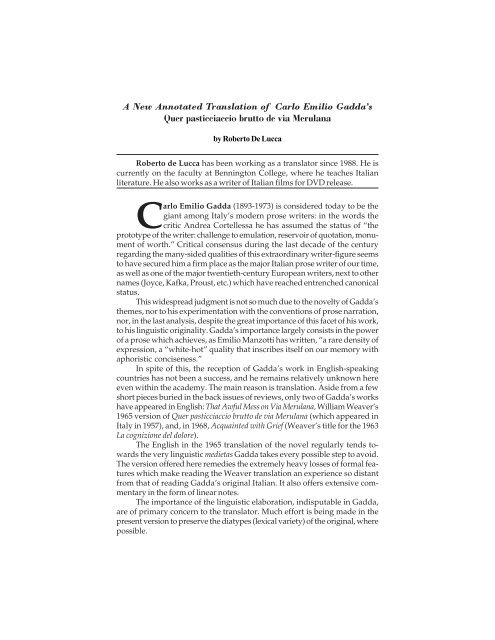Journal of Italian Translation
Journal of Italian Translation
Journal of Italian Translation
Create successful ePaper yourself
Turn your PDF publications into a flip-book with our unique Google optimized e-Paper software.
A New Annotated <strong>Translation</strong> <strong>of</strong> Carlo Emilio Gadda’s<br />
Quer pasticciaccio brutto de via Merulana<br />
by Roberto De Lucca<br />
Roberto de Lucca has been working as a translator since 1988. He is<br />
currently on the faculty at Bennington College, where he teaches <strong>Italian</strong><br />
literature. He also works as a writer <strong>of</strong> <strong>Italian</strong> films for DVD release.<br />
Carlo Emilio Gadda (1893-1973) is considered today to be the<br />
giant among Italy’s modern prose writers: in the words the<br />
critic Andrea Cortellessa he has assumed the status <strong>of</strong> “the<br />
prototype <strong>of</strong> the writer: challenge to emulation, reservoir <strong>of</strong> quotation, monument<br />
<strong>of</strong> worth.” Critical consensus during the last decade <strong>of</strong> the century<br />
regarding the many-sided qualities <strong>of</strong> this extraordinary writer-figure seems<br />
to have secured him a firm place as the major <strong>Italian</strong> prose writer <strong>of</strong> our time,<br />
as well as one <strong>of</strong> the major twentieth-century European writers, next to other<br />
names (Joyce, Kafka, Proust, etc.) which have reached entrenched canonical<br />
status.<br />
This widespread judgment is not so much due to the novelty <strong>of</strong> Gadda’s<br />
themes, nor to his experimentation with the conventions <strong>of</strong> prose narration,<br />
nor, in the last analysis, despite the great importance <strong>of</strong> this facet <strong>of</strong> his work,<br />
to his linguistic originality. Gadda’s importance largely consists in the power<br />
<strong>of</strong> a prose which achieves, as Emilio Manzotti has written, “a rare density <strong>of</strong><br />
expression, a “white-hot” quality that inscribes itself on our memory with<br />
aphoristic conciseness.”<br />
In spite <strong>of</strong> this, the reception <strong>of</strong> Gadda’s work in English-speaking<br />
countries has not been a success, and he remains relatively unknown here<br />
even within the academy. The main reason is translation. Aside from a few<br />
short pieces buried in the back issues <strong>of</strong> reviews, only two <strong>of</strong> Gadda’s works<br />
have appeared in English: That Awful Mess on Via Merulana, William Weaver’s<br />
1965 version <strong>of</strong> Quer pasticciaccio brutto de via Merulana (which appeared in<br />
Italy in 1957), and, in 1968, Acquainted with Grief (Weaver’s title for the 1963<br />
La cognizione del dolore).<br />
The English in the 1965 translation <strong>of</strong> the novel regularly tends towards<br />
the very linguistic medietas Gadda takes every possible step to avoid.<br />
The version <strong>of</strong>fered here remedies the extremely heavy losses <strong>of</strong> formal features<br />
which make reading the Weaver translation an experience so distant<br />
from that <strong>of</strong> reading Gadda’s original <strong>Italian</strong>. It also <strong>of</strong>fers extensive commentary<br />
in the form <strong>of</strong> linear notes.<br />
The importance <strong>of</strong> the linguistic elaboration, indisputable in Gadda,<br />
are <strong>of</strong> primary concern to the translator. Much effort is being made in the<br />
present version to preserve the diatypes (lexical variety) <strong>of</strong> the original, where<br />
possible.
















